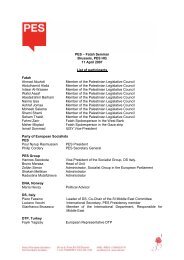Hedge funds and Private Equity - PES
Hedge funds and Private Equity - PES
Hedge funds and Private Equity - PES
You also want an ePaper? Increase the reach of your titles
YUMPU automatically turns print PDFs into web optimized ePapers that Google loves.
166<br />
The European Commission should establish robust minimum st<strong>and</strong>ards with respect to the<br />
following:<br />
rules on valuing hard-to-value, illiquid assets so that investors can be reassured that asset<br />
prices used in valuations are fair <strong>and</strong> independently obtained. These rules should apply to all<br />
internal <strong>and</strong> external parties in the valuation chain including fund managers, administrators,<br />
providers of market prices, verification staff, <strong>and</strong> auditors;<br />
the frequency <strong>and</strong> basis of valuations;<br />
the use of portfolio stress testing to establish valuation parameters;<br />
the relationship between internal <strong>and</strong> external parties involved in the valuation process to<br />
manage conflicts of interest <strong>and</strong> ensure a clear separation of duties between fund managers<br />
<strong>and</strong> those providing support services;<br />
the use of independent ratings <strong>and</strong> valuation agencies to communicate overall risk to<br />
investors.<br />
The EC should set up an independent expert working group consisting of consumer <strong>and</strong> public<br />
interest, representatives from corporate business, social partners <strong>and</strong> industry representatives to<br />
establish proposals for these minimum st<strong>and</strong>ards.<br />
3.4 Systemic risks<br />
As well as posing considerable potential risks to individual investors (or pension <strong>funds</strong>),<br />
concerns have been raised about wider market or systemic risks – in particular, financial<br />
stability, market disruption <strong>and</strong> disorderly markets (due to liquidity risks) <strong>and</strong> lack of transparency<br />
which can undermine regulatory effectiveness.<br />
To promote better management of these systemic risks the EC should introduce new requirements<br />
for national regulators to improve reporting procedures. These should include:<br />
a requirement for national regulators to publish regular assessments <strong>and</strong> analysis of the<br />
concentration of hedge fund investments in sectors;<br />
detailed reporting requirements for individual firms. Firms should be required to report detailed<br />
information with regard to positions <strong>and</strong> investment strategies to their national regulator;<br />
The EC should create a centralised mechanism to allow for consolidated assessment of<br />
market positions <strong>and</strong> analysis of systemic risk.<br />
***<br />
As far as financial stability is concerned, the link between credit <strong>and</strong> liquidity risk is the gist of<br />
the matter. To make indirect regulation of credit risk via banks workable, monitoring the extensive<br />
use of derivatives is crucial. The global hedge <strong>funds</strong>’ leverage is ruled by a very restricted<br />
number of prime brokers. So the first task of financial authorities should be to ask prime brokers<br />
for a periodic full disclosure of the exposure (fund by fund <strong>and</strong> then of the whole client base) to<br />
different categories of financial risks. Potential future credit exposure should be measured <strong>and</strong><br />
stress testing performed.<br />
In order to protect retail investors, promoters <strong>and</strong> intermediaries should be required to include<br />
scenarios in any promotions illustrating the impact of adverse market movements on investors’




